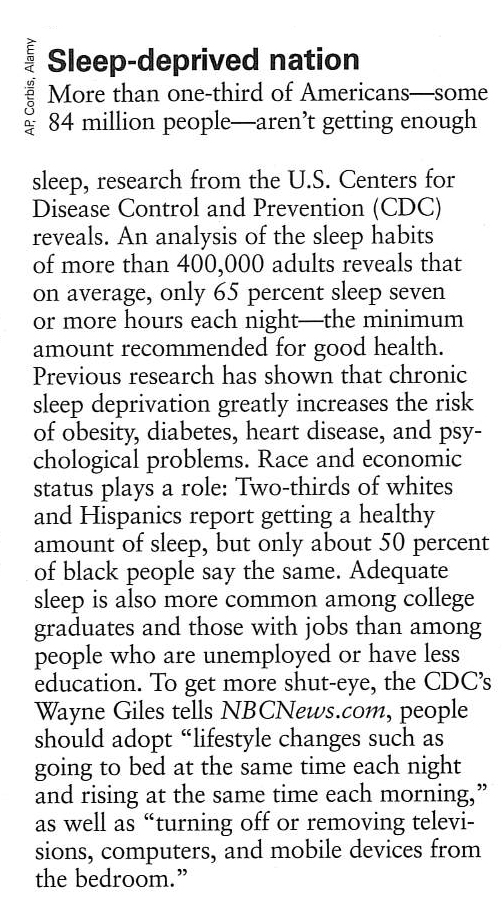Learn how much sleep is enough, what happens with a little and lots less sleep, pharmaceutical orientations toward sleep, mystical orientations, and sleep articles and tidbits that will make you the life of the party as you regale people with your knowledge!
To the health of your children and yourselves!
Each of the below brings you to a new page on Augusta’s site with resources and clippings.
Sleep Stats
Physical Health
Emotional Health
Junk Sleep
Learning
Drugs
Sleep Debt and Naps
Children and Sleep
Sleep Better
Sleep centers / organizations
| http://www.sleepfoundation.org/ | Alerting the public, healthcare providers and policymakers to the life-and-death importance of adequate sleep |
| http://www.sleepforkids.org/ | Created by the above: “the only website dedicated to children’s sleep just for kids.” Information, education, and games. |
| http://www.aasmnet.org/ | The only professional society dedicated exclusively to the medical subspecialty of sleep medicine. |
Here’s a few starter stats for you 🙂
- People with more sleep report being happier “Optimistic and satisfied with life”
- Three times more likely to get sick after exposure to a cold virus
- Lack of or impaired enthusiasm and creativity
- Increased vulnerability to stress
- Lower attention span
- 50% reduction in response time
- Emotionally more reactive (brain scans, and reactions to images like spiders, sharks, and burn victims)
- Twice as likely to sit and seethe in traffic jams, quarrel with other people, and generally be stressed
- Higher blood pressure
- Difficulty attending to tasks at hand
- Decisions are hampered (military studies)
- Instructions are followed with more errors: 30% better on SAT-type tests when well rested (but the memorization of facts already known is minimally effected)
- Skin repairs itself during the last hour
- Rats deprived of sleep die faster than those deprived of food
- Free radicals are missing one electron; they’re very unstable and bind to other molecules in nerve cells and elsewhere–and when they do they damage those cells. Superoxide Dismutase (SOD) levels drop when sleep deprived, and they break free radicals up into their parts. Especially true in the brain.
- New brain cell formations are cut in half when sleep deprived. The new cells that are formed don’t mature correctly
- Nearly one-fourth of partnered adults said that they have sex less often or have lost interest in sex because they’re too sleepy.
- Overeat — One hour less per night doubles your odds of being overweight
- Appetite-suppressing hormones decrease (leptin)
Stress cortisols increase (regulates metabolism of sugar, protein, fat, minerals and water) - Decreased glucose tolerance.
- Insulin is also impacted via sleep.
- Appetite-suppressing hormones decrease (leptin)
- Sleeping 5 hours a night doubles your chance of dying of a heart attack
- Sleeping 9+ hours every night also doubles your chance of a heart attack
- Mentally ill people are often chronically sleep deprived
- Catching up on the weekend – still perform worse on cognitive tests than those who slept enough through the week
- Immune system memory is hampered at 7 or less hours per night regularly
- The orbitofrontal cortex, an area that aids in learning from a loss or a bad decision, is less active. Researchers suspect that poor sleep, besides prompting risky behaviors, hinders the brain’s ability to process emotions, such as regret. The result? You’re less likely to think about the consequences of a decision.
- “What sold me,” says Shaw, “is that sleep is costly. When an animal sleeps it’s not taking care of its young, it’s not protecting itself, it’s not eating, it’s not procreating.” That vulnerability, he says, once led sleep research pioneer Alan Rechtschaffen, PhD, to say “If sleep doesn’t serve an absolutely vital function, it is the biggest mistake evolution ever made.”

